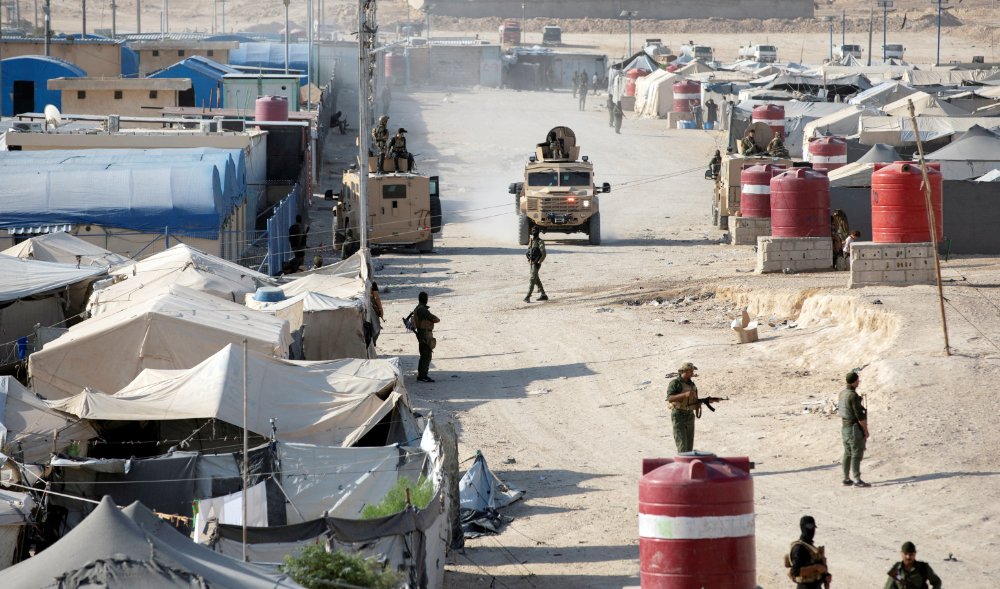AMMAN/BEIRUT: The head of the US armed forces’ Central Command has urged countries from around the world to repatriate their nationals from a northeast Syrian camp housing jihadists’ wives and children.
Al-Hol camp holds around 56,000 people — mostly Syrians and Iraqis, but also around 10,000 who consist largely of wives and children of Daesh fighters originating from further afield.Many were taken to the camp during the defeat of the jihadist group’s self-declared caliphate by US-backed Syrian Kurdish forces in 2019.”I encourage all of the countries that have citizens there to repatriate, rehabilitate and reintegrate” camp residents, CENTCOM’s Gen. Michael Kurilla told reporters in Jordan’s capital Amman.
Syria’s Kurds — who run a semi-autonomous administration in northeast Syria — have repeatedly begged countries to repatriate their citizens.But such calls, despite being echoed by the UN, have largely fallen on deaf ears, due to fears returnees might pose a security threat back home and trigger a domestic backlash.Daesh seized around a third of Iraq and swaths of war-torn Syria in 2014, recruiting foreign jihadists from around the world, before it was gradually ground down by US-backed forces on both sides of the border.The foreigners at Al-Hol are detained in a secure area away from other camp residents, since many of them are still highly radicalized, posing problems for Kurdish guards and other camp residents.”I think we have to look at this with empathy … because there is no military solution to this,” Kurilla said.”The only solution is to repatriate, rehabilitate and reintegrate” camp residents.About 50 percent of Al-Hol’s inhabitants believe Daesh’s “vile ideology,” Kurilla said, while the other 50 percent “are those who have no other place to live and would like to … go back to their native country.”The camp has grown increasingly volatile this year, with at least 26 people murdered up to late August, according to the UN.Around 700 Daesh-linked Iraqis are being repatriated per month from Al-Hol, said Kurilla. It will take “about four years” to repatriate the Iraqi residents alone at that rate, he noted.”We will have to accelerate that to a much faster” rate, he said, adding that the US was working with Iraqi authorities toward that end.But repatriations to other countries have been even slower.In late July, the Kurdish administration handed Tajikistan 146 women and children related to Daesh fighters, in the first such repatriation to the ex-Soviet state.France in early July repatriated 35 children and 16 mothers from camps in northeast Syria, according to the Foreign Ministry, taking the total number of children returned to Paris to 161.Kurdish-led forces last month launched a security operation to flush out fighters hiding out in Al-Hol following a resurgence of attacks. Dozens of suspected Daesh operatives have been detained and major networks dismantled since the start of operations, the US-led anti-Daesh coalition said last week.Separately, the UN representative in Syria said a cholera outbreak in several regions of the country presents “a serious threat to people in Syria and the region.”He called for an urgent response to contain its spread.The outbreak is believed to be linked to irrigation of crops using contaminated water and people drinking unsafe water from the Euphrates River which bisects Syria from the north to the east, UN Resident and Humanitarian Coordinator Imran Riza said in a statement.The widespread destruction of national water infrastructure after more than a decade of war means much of the Syrian population is reliant on unsafe water sources.Richard Brennan, Regional Emergency Director of the World Health Organization Eastern Mediterranean Region, said the agency had recorded eight deaths from the disease since Aug. 25: Six in Aleppo in the north and two in Deir Ezzor in the east.”This is the first confirmed cholera outbreak in recent years … the geographic spread gives cause for concern and so we have to move fast,” he said.The outbreak is centered in the northern Aleppo region, where more than 70 percent of a total 936 suspected cases have been recorded, and Deir Ezzor where more than 20 percent were registered.A smaller number of suspected cases have been recorded in Raqqa, Al-Hasaka, Hama and Lattakia.The number of confirmed cholera cases is 20 in Aleppo, four in Lattakia and two in Damascus.Prior to the recent cholera outbreak, the water crisis had caused an increase in diseases such as diarrhea, malnutrition and skin conditions in the region, according to the WHO.Brennan said the WHO was appealing to donors to increase funding as the organization was already dealing with a number of cholera outbreaks in the region, including in Pakistan where floods have exacerbated a pre-existing outbreak.”We need to scale up surveillance and testing capacity … efforts are underway to truck clean water to the communities most affected,” he said.




